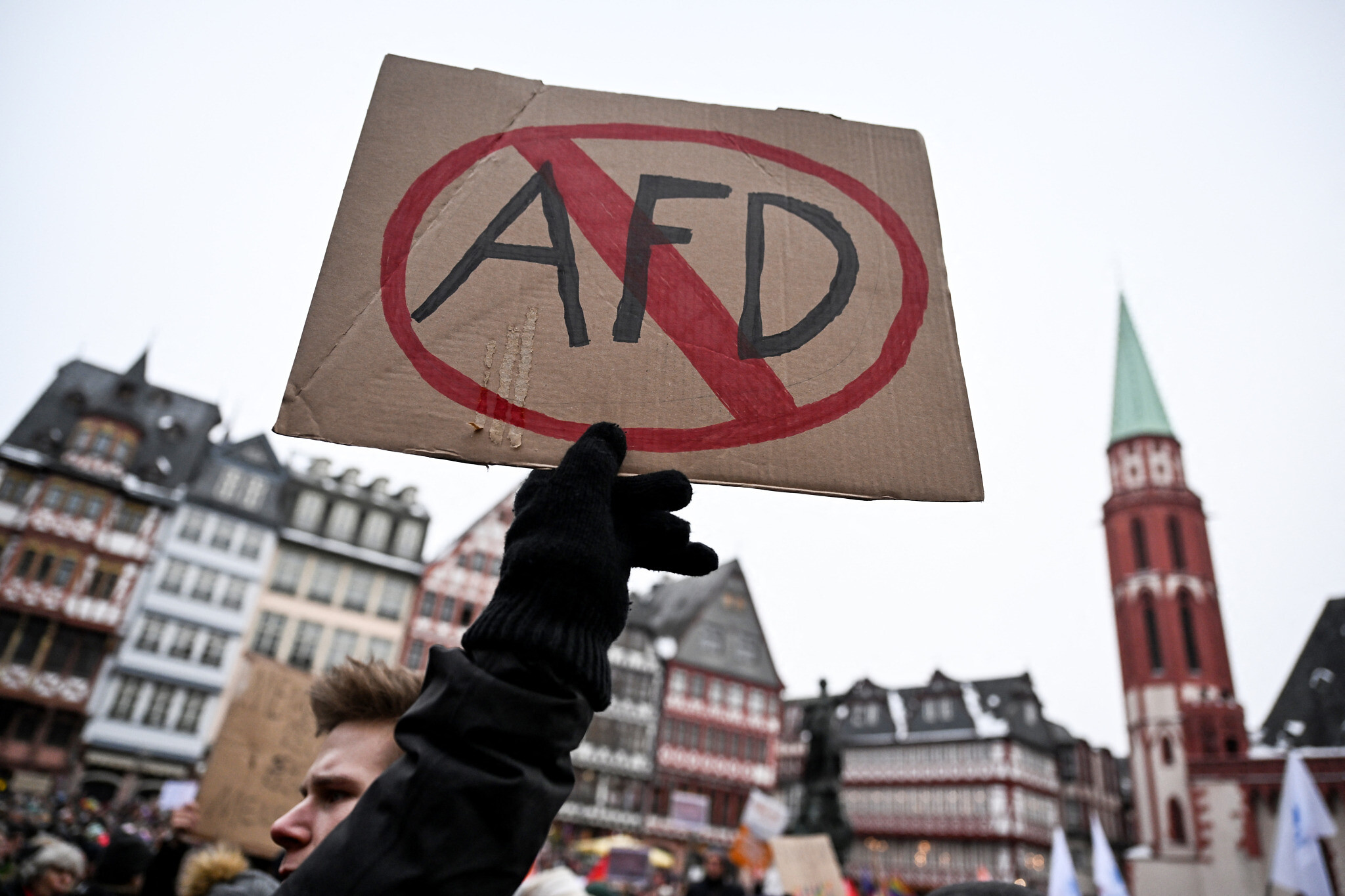
Alternative für Deutschland (AfD) has risen to become the second-highest polling political party in Germany, even though it openly apologizes for Hitler's Nazi party. Many European far-right parties are hiding or distancing themselves from their fascist associations or ideas. By contrast, Alternative for Germany has been gaining votes despite moving more and more towards fascism, xenophobia and anti-Semitism. So what is really going on?
The “remigration masterplan”
In January 2024, an estimated 1.4 million people took part in anti-Nazi protests across Germany. This was in reaction to news breaking of a secret far-right meeting in Potsdam that involved prominent AfD politicians in November 2023.
At the meeting, plans to deport millions of refugees and people with a migration background were discussed, uncovered by the investigative news platform Correctiv.
Many journalists drew comparisons with the Wannsee Conference of 1942, where the Nazis decided on their “Final Solution” to murder Europe’s Jews and other people considered enemies. Two years before that conference, the Nazis discussed the “Madagascar Plan,” a scheme for the mass deportation of Jews to the East African island country.
History warns us that the proposal to deport a group of people can be a step on the path of dehumanizing that community — a path that can end with their mass murder.
After last year’s gathering in Potsdam, AfD leader Alice Weidel tried to distance the party from its alleged deportation plans. Yet René Springer, a leading AfD politician in the Brandenburg state parliament, said, “We will return foreigners to their homeland. Millions of times. This is not a secret plan. It’s a promise.”
Nazism is one of the most studied periods of history and dominates school curricula, universities, documentaries, films and popular culture. The message underlying this historical focus is the response of “never again” to genocide. Yet the world seems unwilling to hear or learn this lesson as crimes against humanity continue in places like Gaza, Darfur, Syria and Ukraine.
Senior AfD politicians’ connections to a plan for mass deportation is just one link to Germany’s 1920-1940s Nazi past. AfD's top candidate for the 2024 European elections claimed that the SS were not necessarily criminals – even though the SS were Hitler's paramilitaries who orchestrated the Holocaust.
The AfD party leader in the state of Thuringia, Björn Höcke, was found guilty of using Nazi phrases in 2021. The frequency of such examples, particularly Holocaust denial, was the reason that the German anti-Semitism commissioner Felix Klein condemned the party in 2023 as a threat to the country’s Jewish population.
Why are the AfD so popular?
The AfD was founded in 2013 and focused mainly on a nationalist-oriented economics and opposition to the Greek bailout. After 2015 and the rise in refugees across Europe, which Germany played a leading role in welcoming, the party became increasingly anti-immigrant, xenophobic and far-right. The party has since gained support on these issues.
But from the start, the AfD’s logic of blaming Greece for the bailout or scapegoating migrants and refugees made no sense. The EU bailout money did not go to the Greek people, instead to the Greek banks so that they could repay German and other financial institutions.
Similarly, migrants from the global South are not an existential threat to Europe. In reality, Europe's leading role in wars, climate change, food speculation and other capitalist activities is forcing people to flee their homelands, and relatively few are going to Europe.
Yet despite, or perhaps because of, the party’s simple, nonsensical answers to complex questions, the AfD has grown in popularity.
The AfD has also benefited from incoherent or ill-conceived government policies, such as requirements to replace gas boilers with environmentally friendly heat pumps. Germany's governing coalition made this ecologically progressive but unpopular and expensive move, and paid a political cost as a result. AfD has consistently resisted climate measures and anti-COVID precautions by denying the existence of these complex problems.
The AfD, which has its base in eastern Germany, holds many differences with the Nazis. Yet the party’s rise – and the broader split in the anti-Nazi consensus that it represents – indicates that many Germans today feel they are facing similar problems to the ones the country faced nearly a century ago.
Keeping the AfD out of power
Hitler became Chancellor in 1933, with either direct support or acquiesce from conservatives and more distant political opponents. Opposition parties naively thought they could either control or disempower Hitler. Some thought his actions would not match his extreme rhetoric. History proved them all wrong.
In Germany, the established parties, including the conservatives (CDU), have declared that they will not work with the AfD. Yet, there are cracks in this firewall. Some CDU members attended the meeting in Potsdam and there is talk about aspirations to form a breakaway conservative party that will form a coalition with the AfD.
With regional elections slated this year, and federal elections in 2025, the AfD poses a very real and immediate political threat.
After 1945, Germany established some of the toughest anti-Nazi laws in existence. Based on these laws, there are court cases — and debates — about banning the AfD completely or removing its funding. (Parties receive state funding depending on their share of votes in previous elections).
A court case has already led to the AfD's youth organization being banned in three former East German regions.
But state sanctions against the party are not without problems, as it helps to further the sense of victimhood that ties to the AfD's victimhood narrative against the German state.
Keeping the AfD out of political coalitions and government as its popularity rises has its own pitfalls (which are albeit better than giving the party power outright). Of particular concern is the way the center-left German government coalition is moving to mimic a slimmed-down version of AfD anti-immigrant policies.
As happened recently in France with its centrist government, this can be a dangerous approach, since many people flock to the hardliners. But France may also offer a way out for Germany: the French left seems to have turned the corner, forming a broad alliance to keep the far-right from gaining power — for now.
As Germany faces a party that is far too easily compared to the Nazis of the 1920s and 30s, progressive forces there now have the task of writing a new history of resistance and alternatives.

















